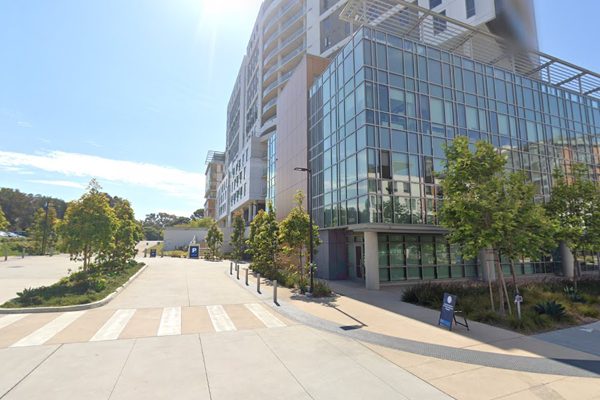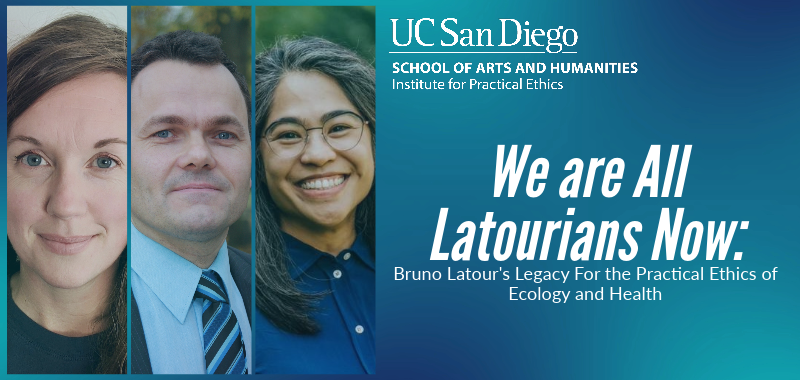We are All Latourians Now
December 4, 2023 | UC San Diego | School of Social Sciences | PEB 720
Bruno Latour’s Legacy for the Practical Ethics of Ecology and Health
This one-day symposium promises to be a thoughtful exploration of the enduring influence of the late Bruno Latour. This symposium will delve into the legacies of Latour, who left an indelible mark on the fields of science and technology studies. In particular, our expert speakers will unravel the ethical dimensions of Latour’s work, especially his later contributions.
Known as "the post-truth philosopher," Bruno Latour’s ideas and methodologies challenged conventional truths, making him a controversial figure among truth-seekers and, in particular, ethically minded scholars in the humanities and social sciences.
Full Agenda
- 9:00 am | Welcome and introduction
- John Evans, Professor of Sociology and Director of the Institute for Practical Ethics, UC San Diego
- Kelly Gates, Associate Professor of Communication and Director of the Science Studies Program, UC San Diego
- 9:15 - 9:45 am | Latour was Not a Post-truth Philosopher: The Latour-Strum Collaboration and the Re-calibration of Locus, Focus, and Scope
- David E. Pedersen, Department of Anthropology, UC San Diego
- David E. Pedersen, Department of Anthropology, UC San Diego
- 9:45 - 10:45 am | An Epistemological Delirium: From the ‘Science Wars’ to the ‘Culture Wars’
- Joost van Loon, Chair of Sociology and Sociological Theory, Catholic University of Eichstätt-Ingolstadt, Germany
- Q&A moderated by Nima Boscarino, Ph.D. student, Communication and Science Studies
- 10:45 am | Break
- 11:00 am - 12:00 pm | The Original Sins of Natural Religion
- Juno Salazar Parreñas, Associate Professor of Science and Technology Studies and Feminist, Gender and Sexuality Studies, Cornell University
- Q&A moderated by Lian Song, Ph.D. student, Communication and Science Studies
- 12:00 pm | Break
- 12:15 - 1:15 pm | The Empiricism Strikes Back
- Joyce Havstad, Associate Professor of Philosophy, University of Utah
- Q&A moderated by Gian Gregorio, Ph.D. student, Anthropology and Science Studies
- 1:15 - 1:30 pm | Conclusion
- David Serlin, Associate Professor of Communication and Science Studies, UC San Diego
- 1:30 - 3:00 pm | Reception
*All times listed are Pacific time zone. Non-UC San Diego speakers will appear remotely, with all attendees in person.
Abstracts and bios
Bruno Latour had a significant relationship with UC San Diego and La Jolla for nearly half a century. His classic work "Laboratory Life" (1979) involved fieldwork at the Salk Institute, and a decade later, he served as an advisor to the Science Studies Program at UC San Diego, when it was formalized in 1989. This unique connection makes UC San Diego the ideal setting to convene scholars, scientists and the public for a meaningful discussion on the ethical legacies of Latour's work, especially in the context of our rapidly changing environmental landscape.
Joost van Loon
An Epistemological Delirium: From the ‘Science Wars’ to the ‘Culture Wars’
The controversies surrounding most — if not all — current apocalyptic events are not merely matters of cognitive dissonance that can be solved by the production of facts. “Denegation poisons those who practice it as well as those who are presumed duped by it,” Latour wrote in his 2018 book Down to Earth. “In doing so, it proposes us to refocus our attention on ‘science in the making’ in relation to ‘matters of concern’.” Picking up the gauntlet thrown down by Latour in Down to Earth, this presentation will situate Latour’s ecological “matters of concern” in relation to earlier debates in STS regarding relativism and “social constructions” — that were at the centre of the so-called “science wars,” concluding with the more current modes of politicizing science-as-made which have spilled over into a range of controversies over subjectivity and modes of embodiment, better known as “the culture wars,” which Latour himself referred to as “the brutalization of public discourse.” I argue that the links between politics and truth were not severed with the US presidential elections of 2016; they were already severed when political economy became based on the belief (or hope) that the earth is big enough for all of us, which for the sake of polemical clarity I will refer to (following Bernard Stiegler) as “the Neoliberal Jihad.”
Biography
Joost van Loon is Chair of General Sociology and Sociological Theory at Catholic University of Eichstätt-Ingolstadt, Germany, and the author of “Risk and Technological Culture: Towards a Sociology of Virulence” and “Media Technologies: Critical Perspectives.” He is also editor of the journal Space and Culture.
Juno Salazar Parreñas
The Original Sins of Natural Religion
Bruno Latour’s collection of essays “Facing Gaia: Eight Lectures on the New Climatic Regime” (2017) is based on a series of lectures inspired by the topic of “natural religion.” It is a “hybrid style for a hybrid subject addressed to a necessarily hybrid audience” who are alarmed about the “profound mutation in our relation to the world.” This profound mutation is what is increasingly called climate breakdown. While Latour sees the source of the problem in Nature/Culture, I see multiple origin stories to the problem of climate breakdown: domestication, colonialism, and 20th century modernization.
Biography
Juno Salazar Parreñas is Associate Professor of Science & Technology Studies and Feminist, Gender & Sexuality Studies at Cornell University. She is the author of “Decolonizing Extinction: The Work of Care in Orangutan Rehabilitation.”
Joyce Havstad
The Empiricism Strikes Back
The shift from the early to late work of Bruno Latour arguably begins with “Why Has Critique Run Out of Steam?” In this pivotal piece, Latour writes: “The question was never to get away from facts but closer to them, not fighting empiricism but, on the contrary, renewing empiricism” (2004, 231). Yes, wonderful—says I, an STS-minded but still quite traditionally empiricist philosopher of science. Other philosophers of science would agree, so why are we not all Latourians now? In this talk, I address this question, focusing on how Latour’s complex “matters of concern” can be made feel real, immediate, and perceptible to both philosophers and the public. I argue that science, properly understood in an STS fashion, is an extended form of perception — but we need the means for feeling it that way, for letting it strike us with the force of classical empiricism.
Biography
Joyce C. Havstad is a philosopher of science and values, with a background in scientific practice. She has worked in a soil ecology lab at the UC Davis Bodega Marine Reserve, in a gene expression lab at the Salk Institute for Biological Studies, as philosopher-in-residence at the Field Museum of Natural History, and as Assistant Professor in the Department of Philosophy at Oakland University in Rochester, Michigan. She is now a tenured Associate Professor at the University of Utah — with joint appointments in the Department of Philosophy, the Clinical and Translational Science Institute, and the Office of Research Integrity and Compliance.
Symposium logistics
Directions
- LOCATION: Conference room PEB 720 is located on the 7th floor of the Public Engagement Building, directly connected to the adjacent Arts and Humanities Building. After taking the elevators to the 7th floor of either building, visitors will exit to the center crossway between the two buildings to access the conference room.
- BUILDING LOCATION:
- The Scholl of Social Sciences Public Engagement Building is on the west side of campus within the North Torrey Pines Living and Learning Neighborhood (NTPLLN), near Sixth College. It is located on Muir College Drive directly adjacet to the Arts and Humanities Building, and near the Jeannie Auditorium and the Craft Center. It is part of the Ridge Walk Academic Complex (RWAC).
- BUILDING ADDRESS:
-
- Ridge Walk Academic Building
9625 Scholars Drive North
La Jolla, CA 92093-0406
- Ridge Walk Academic Building
-
- The above address goes to the Sixth College building, near Sixth Market, and the corner of Scholars Drive North and Muir College Drive. To get to the Public Engagement Building from this location, walk up the stairs (passing by Sixth Market) and straight across the large lawn. The Public Engagement Building is on the left beyond the center lawn.
Parking and Transportation
Parking
The closest parking to the Arts and Humanities Building is in the Scholars Parking Structure, the underground parking garage desginated as the "Scholars Parking - North Entrance" on the UC San Diego campus map. The entrance to the parking garage is on the corner of Scholars Drive North and Muir College Drive.
- Scholars Parking Structure: 9500 Muir College Dr, La Jolla, CA 92093
This parking garage includes spaces for visitors, staff and students. Permits are required for parking and details can be found on the campus transportation website. Once in the parking garage, the Arts and Humanities Building can be accessed by walking up the stairs or taking elevators in the parking garage labeled "Arts and Humanities."

Public Transit
Several mass transit routes serve the campus and surrounding area. In 2021, the San Diego Metropolitan Transit System opened the trolley route called the UC San Diego Blue Line, with a station at UC San Diego, extending trolley access from the Mexico border to campus. UC San Diego offers different programs that provide discounted transit access for faculty, staff and students.
Contact
For immediate inquiries, please email ahnews@ucsd.edu
Organized by Kelly Gates and David Serlin of the Institute of Arts and Humanities Science Studies Program, with Nima Boscarino and Shubhra Murarka, “We Are All Latourians Now” is supported by the UC San Diego Institute for Practical Ethics.
